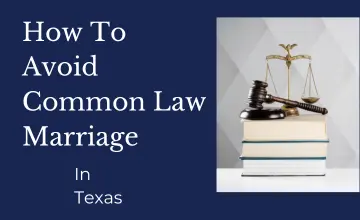
Here in Texas if you are living together (also referred to as “cohabitating”) and want to avoid being designated as being in a common law marriage you need to read up and be educated on the law regarding Proof of Informal Marriage.

The Texas state law that outlines how to prove a common law or “informal” marriage is covered in Section 2.401 of the Texas Family Code.
Steps To Follow
There are several steps you can take to avoid being designated as having a common law marriage, there are a lot of DON’Ts:
- Do not hold yourself out as being married.
- Don’t introduce your partner as your spouse.
- Don’t refer to them as your husband or wife.
- Don’t file federal tax returns as a married couple. (Totally understand that you want to save money on taxes but this will likely trigger a common law marriage)
- Keep separate finances: Do not share bank accounts or credit cards with your partner, and keep all financial records separate.
- Make your intentions clear: Have a conversation with your partner about your intentions and agree that you do not want to be considered married under common law in Texas.
- Have a written agreement: Consider creating a written agreement with your partner that explicitly states that you are not married under common law in Texas.
It is important to note that simply living apart from your partner for a certain amount of time does not automatically dissolve this type of marriage in Texas.
If all three elements of a common law marriage were present at some point, it may still be considered valid.
Be Proactive
So you need to take proactive steps to avoid establishing a common law marriage if that is your intention.
Give us a call here at Blizzard and Zimmerman Attorneys and schedule a one-on-one consultation with one of our attorneys for legal help regarding marriage issues as well as for a cohabitation agreement, prenuptial agreement, divorce, or any family law-related matter. Our legal team will work their best to get you the best outcome for your legal matter.
Related information
About The Attorney

Attorney Matt Zimmerman’s passion for the law has led him to develop a practice that focuses on advising couples on legal marriage, divorce, co-habitation, and pre-nuptial agreements.
With extensive experience in these areas, he provides guidance to ensure that all legal aspects of a couple’s relationship are thoroughly addressed, protecting their interests and laying a strong foundation for their future together. Whether you are planning to marry, live together, or are considering a pre-nuptial agreement, Attorney Zimmerman is dedicated to offering advice tailored to your unique situation.
Disclaimer
Attorney Matt Zimmerman works tirelessly to achieve the greatest possible results for each of our clients. The information provided here does not create any attorney client relationship. You are encouraged to seek and consult with an attorney that is competent in the legal issues you face and qualified to practice law in your state.

